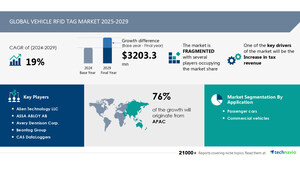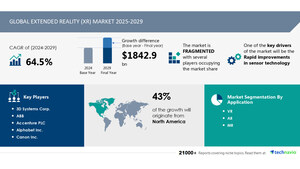NEW YORK, July 12, 2024 /PRNewswire/ -- The global equine healthcare market size is estimated to grow by USD 582.4 million from 2024-2028, according to Technavio. The market is estimated to grow at a CAGR of 6.78% during the forecast period. Rise in incidences of zoonotic diseases is driving market growth, with a trend towards adoption of new technologies. However, high costs associated with equine healthcare poses a challenge. Key market players include Alltech Inc., Boehringer Ingelheim International GmbH, Central Garden and Pet Co., Ceva Sante Animale, Dechra Pharmaceuticals Plc, Elanco Animal Health Inc., Equine Products UK LTD., Esaote Spa, Forte Healthcare Ltd., Hallmarq Veterinary Imaging Ltd., IDEXX LABORATORIES INC., Jacks Inc., Kemin Industries Inc., Land O Lakes Inc., Merck KGaA, Peak Equine Health, Scone Equine Group, Thermo Fisher Scientific Inc., Vetoquinol SA, and Zoetis Inc..
Get a detailed analysis on regions, market segments, customer landscape, and companies- View the snapshot of this report
Equine Healthcare Market Scope |
|
Report Coverage |
Details |
Base year |
2023 |
Historic period |
2018 - 2022 |
Forecast period |
2024-2028 |
Growth momentum & CAGR |
Accelerate at a CAGR of 6.78% |
Market growth 2024-2028 |
USD 582.4 million |
Market structure |
Fragmented |
YoY growth 2022-2023 (%) |
6.24 |
Regional analysis |
North America, Europe, Asia, and Rest of World (ROW) |
Performing market contribution |
North America at 44% |
Key countries |
US, China, Mexico, UK, and Germany |
Key companies profiled |
Alltech Inc., Boehringer Ingelheim International GmbH, Central Garden and Pet Co., Ceva Sante Animale, Dechra Pharmaceuticals Plc, Elanco Animal Health Inc., Equine Products UK LTD., Esaote Spa, Forte Healthcare Ltd., Hallmarq Veterinary Imaging Ltd., IDEXX LABORATORIES INC., Jacks Inc., Kemin Industries Inc., Land O Lakes Inc., Merck KGaA, Peak Equine Health, Scone Equine Group, Thermo Fisher Scientific Inc., Vetoquinol SA, and Zoetis Inc. |
Market Driver
The equine healthcare market is experiencing significant growth due to the adoption of new technologies by vendors and increased research and development investments. Notable advancements include Zoetis' expansion of its Vetscan Imagyst platform with new AI applications for dermatology and equine feline fecal analysis in March 2023. IDEXX's January 2022 improvements to its products and services, streamlining veterinary practice operations and providing better insights, also contribute to market growth. These developments underscore the importance of innovation in addressing the needs of the equine industry.
The Equine Healthcare Market is experiencing significant growth due to increasing animal health spending and the expanding equine population. Key trends include the use of analgesics, anti-inflammatory, and anti-infective medications, as well as vaccines for diseases such as equine influenza, equine herpes, rabies, and equine encephalomyelitis. Animal insurance and equine healthcare products are also gaining popularity. Companies like Arenus Animal Health offer a range of equine health solutions. Advanced technologies like CT systems and diagnostics are being adopted for better equine care. E-commerce platforms and equine equipment suppliers cater to the needs of horse farms and racing events. Skilled veterinarians provide essential services, and regenerative therapies like stem cell therapy are emerging. Parasiticides and medicinal feed additives are crucial for parasite control. EquiTrace platform ensures disease tracking and equine vaccination programs. Equine industry participants include horse owners, equine veterinary practitioners, and equine pharmaceutical companies. Diseases like equine infectious anemia and Venezuelan equine encephalomyelitis continue to pose challenges. Tetanus and other common equine diseases require ongoing attention.
Discover 360° analysis of this market. For complete information, schedule your consultation - Book Here!
Market Challenges
- The equine healthcare market faces significant challenges due to high costs, which impact the affordability and accessibility of veterinary services for horse owners. These costs stem from various factors, including specialized expertise, advanced diagnostics, medications, and specialized equipment. Veterinary services encompass a range of care, from routine check-ups to complex surgeries. The high costs result from the specialized knowledge and skills required to diagnose and treat horses. For instance, colic surgery involves considerable expenses, including pre-operative evaluations, anesthesia, surgical equipment, and post-operative care. Medications are essential for equine healthcare but can be expensive. Long-term use or frequent administration of certain medications, such as anti-inflammatory drugs, antibiotics, and hormonal therapies, add to the overall costs. For example, a course of antibiotics for a respiratory infection can result in significant medication expenses. Diagnostic tests are crucial for diagnosing and monitoring health conditions in horses. Advanced imaging techniques, like X-rays, ultrasound, MRI scans, and laboratory tests, require specialized equipment, trained professionals, and laboratory fees, all contributing to higher costs. For instance, a comprehensive lameness evaluation, which includes radiographs, ultrasound scans, and joint fluid analysis, can be quite costly. Specialized equipment is necessary for equine healthcare, including surgical procedures, diagnostics, and rehabilitation. The expense of acquiring, maintaining, and upgrading this equipment is substantial and is typically passed on to horse owners. For example, an equine dental unit with specialized dental instruments, motorized floats, and sedation equipment represents a considerable investment for a veterinary practice. Emergency situations, such as colic or severe injuries, necessitate immediate and intensive veterinary care. Emergency care involves diagnostic tests, surgeries, hospitalization, and round-the-clock monitoring, significantly increasing costs. For example, emergency colic surgery requires substantial costs due to the complexity of the procedure and the need for specialized equipment and skilled veterinary staff. In summary, high costs associated with equine healthcare can hinder the growth of the global equine healthcare market during the forecast period. The expenses stem from factors such as specialized veterinary services, medications, diagnostic tests, specialized equipment, and emergency care.
- The Equine Healthcare Market faces several challenges in providing optimal care for the equine population. Equine industry participants deal with various diseases such as Equine Herpes, Equine Infectious Anemia, Equine Influenza, Rabies, West Nile Fever, and Venezuelan Equine Encephalomyelitis. Equine healthcare requires specialized equipment like equine vaccination programs, parasite control through parasiticides, and equine pharmaceuticals. Skilled veterinarians play a crucial role in equine healthcare, utilizing medicinal feed additives and regenerative therapies like stem cell therapy. Horse farms and racing events prioritize equine health plans to ensure the well-being of their horses during recreational activities. The EquiTrace platform facilitates disease tracking and control. Equine industry challenges include Tetanus, EIA, and Equine influenza outbreaks at horse farms. Minnesota and other regions grapple with parasite control and vaccination programs. Overall, the equine healthcare market demands continuous innovation to address these challenges and maintain the health of horses.
For more insights on driver and challenges - Request a sample report!
Segment Overview
This equine healthcare market report extensively covers market segmentation by
- Product
- 1.1 Pharmaceuticals
- 1.2 Vaccines
- 1.3 Others
- Distribution Channel
- 2.1 Offline
- 2.2 Online
- Geography
- 3.1 North America
- 3.2 Europe
- 3.3 Asia
- 3.4 Rest of World (ROW)
1.1 Pharmaceuticals- The equine healthcare market's pharmaceuticals segment held the largest share in 2023, encompassing various medications and drugs for equine health management. This segment includes formulations for specific health issues, such as anti-inflammatory drugs, antibiotics, dewormers, antiparasitic drugs, antifungal medications, pain relievers, hormonal therapies, and other pharmaceutical formulations. Preventive medications, including vaccines for infectious diseases and parasite control agents, are crucial for disease prevention. Gastrointestinal medications address issues like gastric ulcers, colic, and diarrhea. Respiratory medications manage respiratory conditions, while wound care and dermatological medications treat cuts, abrasions, skin infections, and dermatitis. Pharmaceuticals play a vital role in diagnosing, treating, and preventing various diseases and health conditions, driving the growth of the pharmaceuticals segment in the global equine healthcare market.
For more information on market segmentation with geographical analysis including forecast (2024-2028) and historic data (2017-2021) - Download a Sample Report
Research Analysis
Equine healthcare refers to the prevention, diagnosis, and treatment of diseases in horses. Equine diseases, such as Equine Infectious Anemia (EIA), Rabies, West Nile Fever, and Venezuelan Equine Encephalomyelitis (VEE), pose significant threats to the equine population and the equine industry. Equine industry participants, including equine veterinary practitioners, rely on advanced technologies like CT systems and vaccines to protect horses from these diseases. Animal vaccine manufacturers produce effective vaccines against various equine diseases, ensuring the health and well-being of the equine population. Skilled veterinarians design and implement equine healthcare plans to prevent the spread of diseases and ensure the overall health of horses. Companies like Arenus Animal Health provide a range of equine healthcare products, including vaccines and diagnostic tools, to support the equine industry. Biothermo microchips are used for temperature monitoring in horses, contributing to early disease detection and effective treatment. Equine vaccination programs are crucial for disease prevention and control in the equine industry.
Market Research Overview
The equine healthcare market encompasses a range of products and services designed to maintain the health and wellbeing of horses. Animal healthcare spending on equines continues to grow, driven by increasing demand for advanced diagnostics, vaccines, and pharmaceuticals. Equine diseases such as equine encephalomyelitis, equine herpes, equine influenza, tetanus, rabies, and Venezuelan equine encephalomyelitis pose significant challenges, leading to a focus on preventative measures like vaccination programs and parasite control using parasiticides and medicinal feed additives. Equine industry participants include horse farms, racing events, recreational activities, and equine veterinary practitioners. Innovations in equine healthcare include CT systems, diagnostics, e-commerce platforms like EquiTrace, and emerging technologies like regenerative therapies and stem cell therapy. Horses require specialized equipment and care, and equine healthcare products cater to these needs. Animal insurance offers financial protection against veterinary costs. Arenus Animal Health is one of many companies providing solutions in this market. Anti-inflammatory and analgesic medications, anti-infectives, and bio thermo microchips are essential components of equine healthcare.
Table of Contents:
1 Executive Summary
2 Market Landscape
3 Market Sizing
4 Historic Market Size
5 Five Forces Analysis
6 Market Segmentation
- Product
- Pharmaceuticals
- Vaccines
- Others
- Distribution Channel
- Offline
- Online
- Geography
- North America
- Europe
- Asia
- Rest Of World (ROW)
7 Customer Landscape
8 Geographic Landscape
9 Drivers, Challenges, and Trends
10 Company Landscape
11 Company Analysis
12 Appendix
About Technavio
Technavio is a leading global technology research and advisory company. Their research and analysis focuses on emerging market trends and provides actionable insights to help businesses identify market opportunities and develop effective strategies to optimize their market positions.
With over 500 specialized analysts, Technavio's report library consists of more than 17,000 reports and counting, covering 800 technologies, spanning across 50 countries. Their client base consists of enterprises of all sizes, including more than 100 Fortune 500 companies. This growing client base relies on Technavio's comprehensive coverage, extensive research, and actionable market insights to identify opportunities in existing and potential markets and assess their competitive positions within changing market scenarios.
Contacts
Technavio Research
Jesse Maida
Media & Marketing Executive
US: +1 844 364 1100
UK: +44 203 893 3200
Email: [email protected]
Website: www.technavio.com/
SOURCE Technavio

WANT YOUR COMPANY'S NEWS FEATURED ON PRNEWSWIRE.COM?
Newsrooms &
Influencers
Digital Media
Outlets
Journalists
Opted In





Share this article